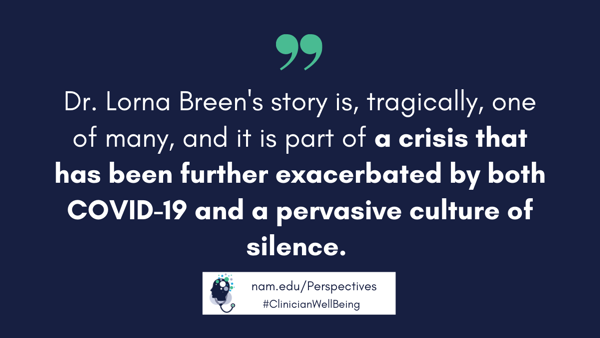Noteworthy Resources

Stigma Compounds the Consequences of Clinician Burnout During COVID-19: A Call to Action to Break the Culture of Silence
By Jennifer B. Feist, J. Corey Feist, and Pamela Cipriano
The National Academy of Medicine's Clinician Well-Being Collaborative has published a NAM Perspectives Commentary by Jennifer B. Feist, J. Corey Feist, and Pamela Cipriano. Ms. Feist's sister, Dr. Lorna Breen, died by suicide after treating COVID-19 patients and contracting COVID-19 herself. Before her death, she expressed fear that seeking mental health treatment would jeopardize her career. In this paper, she and her coauthors call upon health care leaders to break the culture of silence and remove the penalties that prevent so many clinicians from accessing the mental health treatment they need.
While the media congratulates the courage and resilience of health care workers, their day-to-day experience continues to reflect the pre-pandemic reality – that expressing pain or struggle with their work could be perceived as a weakness and a potential impediment to career success.
Addressing Postpandemic Clinician Mental Health
Rachel Schwartz, Jina L. Sinskey, Uma Anand, and Rebecca D. Margolis
Annals of Internal Medicine
The authors performed a literature review of articles addressing clinician mental health during COVID-19 and past pandemics and found that COVID-19 presents unique challenges, suggesting a significant mental health toll on clinicians. They provide a conceptual framework for well-being resource allocation focused on individual, institutional, and societal well-being.
In a narrative review of 96 articles addressing clinician mental health in COVID-19 and prior pandemics, 7 themes emerged: 1) the need for resilience and stress reduction training; 2) providing for clinicians' basic needs (food, drink, adequate rest, quarantine-appropriate housing, transportation, child care, personal protective equipment); 3) the importance of specialized training for pandemic-induced changes in job roles; 4) recognition and clear communication from leadership; 5) acknowledgment of and strategies for addressing moral injury; 6) the need for peer and social support interventions; and 7) normalization and provision of mental health support programs.
Resilience and Burnout Among Physicians and the General U.S. Working Population
JAMA Open
A cross-sectional survey of 5,445 physicians and 5,198 individuals in the working population showed that physicians score higher in resilience than the general public. While higher levels of resilience did correlate with lower rates of burnout, even resilient physicians report suffering from burnout. While individual well-being initiatives including resilience training remain important, there need to be systems-level changes and solutions to reduce burnout.
Targets for improvement include inefficient workplace processes, excessive workloads, and negative leadership behaviors.

